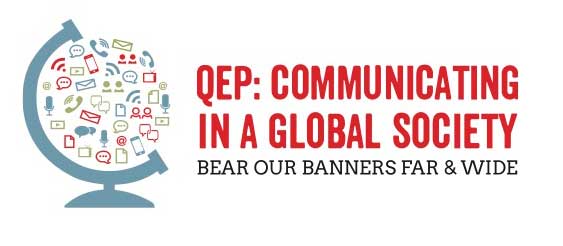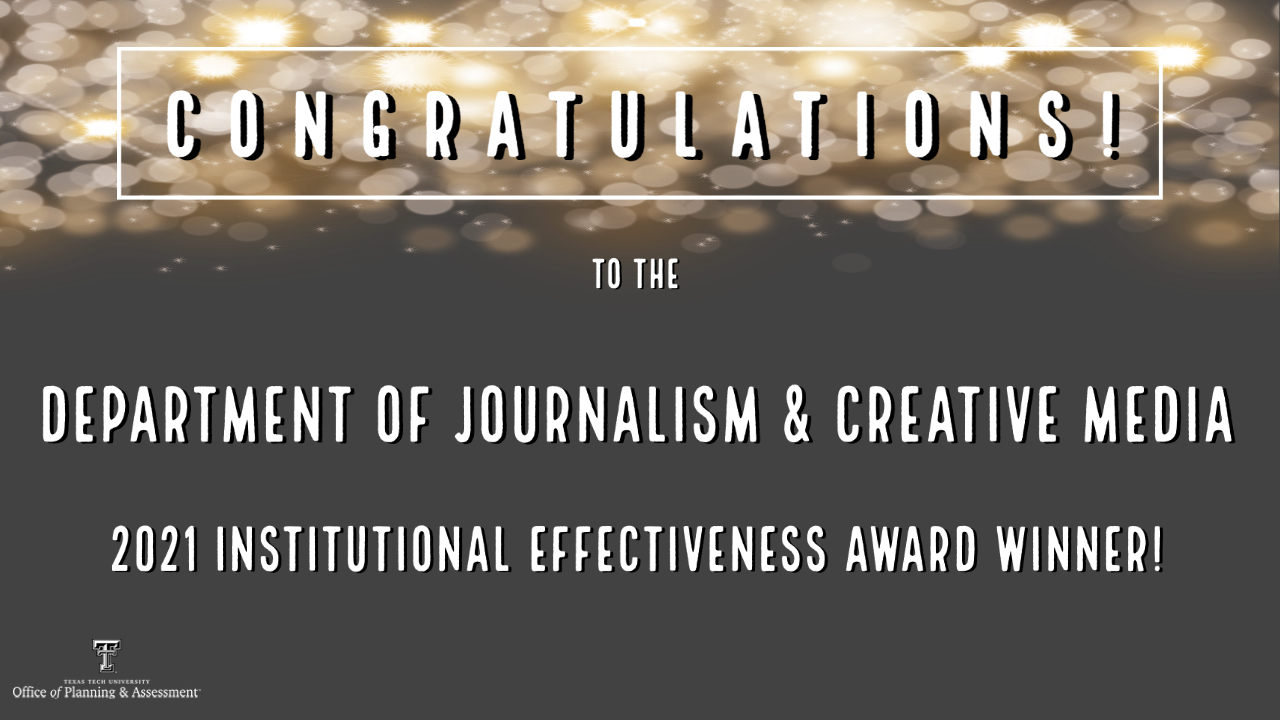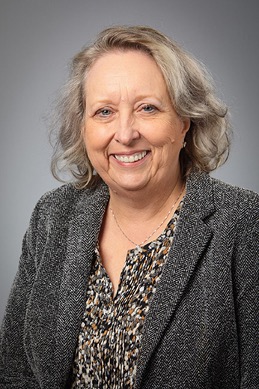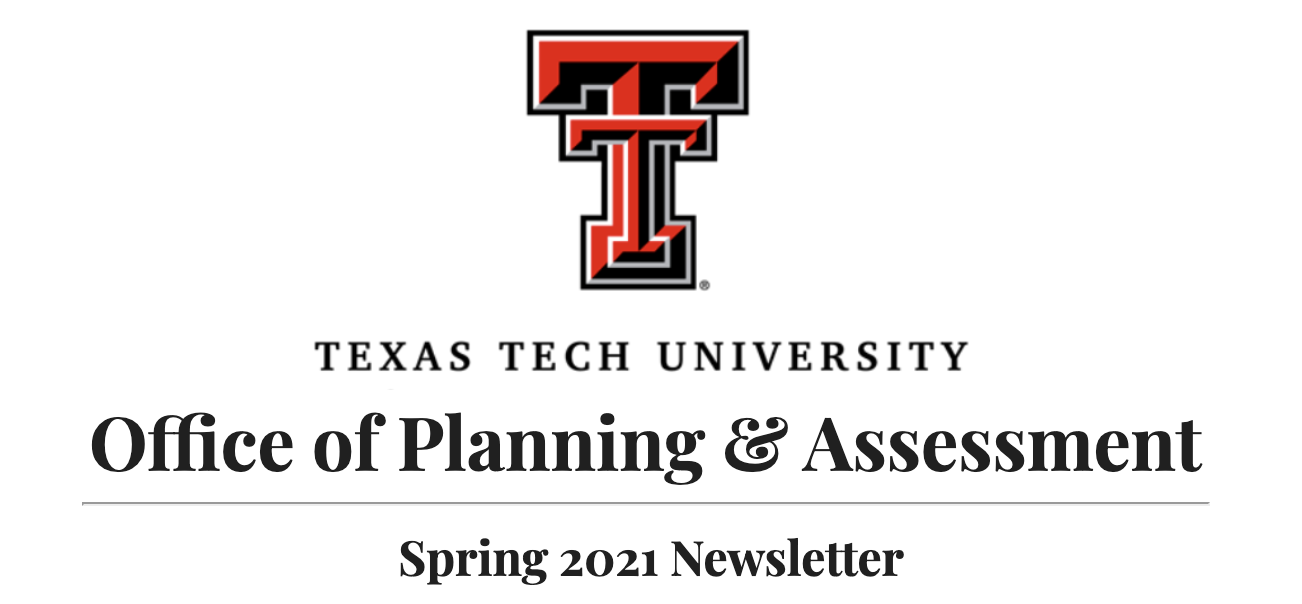
Fifth-Year Report Submission
The university's Fifth-Year Report was submitted on Thursday, March 11. Our report was formally due to SACSCOC on March 15, so we are pleased that our report was submitted ahead of the due date! After nearly 30 months of intensive work, the Office of Planning & Assessment reported on 22 required SACSCOC standards, including the QEP Impact Report. The report covered a wide range of higher education issues: physical resources, student support services, institutional effectiveness, safety and security, financial aid disbursement, student achievement, academic program leadership, and academic administration. Also, the University's 2nd QEP, Bear Our Banners Far and Wide: Communicating in a Global Society, was a major focus of the Fifth-Year Report. Dr. Paul Pare, Professor and QEP Director, discussed all of the positive impacts that the QEP made to the Texas Tech community. The university's next major accreditation milestone will be the 2025 reaffirmation of accreditation, which occurs every ten years.
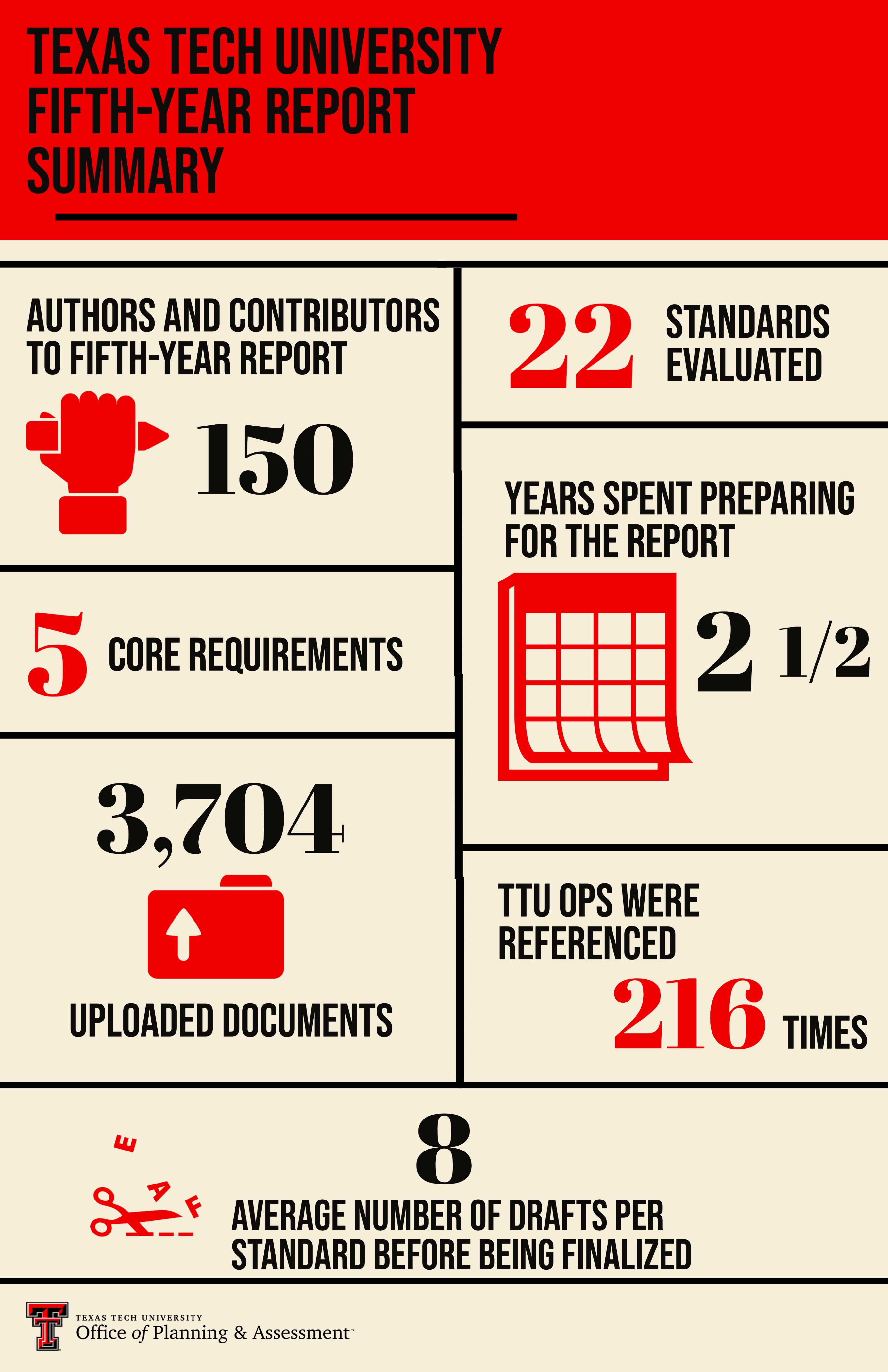
QEP Wrap Up
A required part of the university's Fifth-Year Report is to provide a report on the
university's Quality Enhancement Plan (QEP). This report, titled the QEP Impact Report,
was submitted alongside Texas Tech's 22 required compliance standards. OPA is thankful
to Dr. Paul Pare, QEP Director, for writing this report. A summary of the QEP Impact
report follows.
Texas Tech's second QEP, Bear Our Banners Far and Wide: Communicating in a Global
Society was designed to improve the communication skills and global awareness of Texas
Tech University (TTU) undergraduate students. This Quality Enhancement Plan (QEP)
had two specific goals: 1. TTU students will develop communication skills in a variety
of media that are appropriate to their disciplines and focus on developing them within
a global context, and 2. TTU students will successfully apply these communication
skills in a range of situations with audiences both local and global.
These goals aligned with the Texas Core Curriculum objectives that included attainment
of communication skills as part of every core course. The Student Learning Outcomes
(SLO) developed to meet these goals demonstrated our understanding that acquiring
and honing skills in communication practices and global awareness required a longitudinal
approach by both students and faculty.
- SLO1: students will demonstrate competent communication skills.
- SLO2: students will demonstrate global awareness.
- SLO3: students will articulate global awareness/openness to differences in culture and context diverse groups.
The primary Learning Activities of the QEP were embedded in two specific TTU undergraduate requirements:
- A three-hour Multicultural Course requirement, and
- A six-hour Writing Intensive Course (WI) requirement, which had been expanded to include other forms of communication and renamed the Communication Literacy (CL) requirement.
To coordinate the curricular changes, training opportunities, and assessment activities
of the QEP, the university established the Center for Global Communication (CGC).
The Center's staff, led by a part-time Director, reported to the Vice Provost for
Academic Affairs and worked closely with the Office of Planning and Assessment as
well as subject matter experts on campus to develop and implement the most meaningful
tools for measuring QEP SLOs.
To provide additional instructional support for the QEP, TTU established the Communication
Training Center (CTC). The CTC has been housed in the College of Media and Communication
and staffed by a full-time Director and support staff, including graduate students.
The CTC offers programming for faculty and graduate teaching assistants/part-time
instructors to improve their oral and visual communication skills, as these skills
relate to undergraduate teaching and presentation of research/creative activity.
Texas Tech's second QEP continues to support the institution's desire to prepare students
for the challenges and rewards of thriving in an increasingly interconnected world.
2021 Institutional Effectiveness Excellence Award Winner
OPA is pleased to announce the 2021 Institutional Effectiveness (IE) Excellence Award winner is the Department of Journalism & Creative Media! The Provost's IE Excellence Award is designed to recognize an academic department for institutional effectiveness, as evidenced by the department's commitment to continuous improvement and to improving student learning at the degree program-level. The awarded department will receive a cash prize of $5,000. The application will re-open in Fall 2021 and we encourage all colleges to submit a departmental nomination!
Assessment Spotlight Interview
Dr. Deborah Fowler
Each semester, OPA selects a faculty member who positively contributes to the assessment
culture of their department. For Spring 2021, we are pleased and honored to congratulate
Dr. Deborah Fowler, Professor and Associate Department Chairperson in the Department
of Hospitality and Retail Management.
What is your position and what do you do for Texas Tech?
Professor and Associate Department Chairperson. I teach courses for graduate and undergraduate
students, advise doctoral students and serve on many committees. As the associate
chairperson I manage the schedule, plan and oversee the implementation of our assessment
strategy, and a myriad of other activities to assist the department. I am also the
Retail Management program director and am currently serving with Dr. Shane Blum as
the HRM masters advisor and we will serve as the HRTM Ph.D. advisor while a faculty
member is on leave.
How long have you been at Texas Tech?
Since January 2006
How did you get involved with assessment?
In our department, the associate chairperson is responsible for conducting and overseeing
the assessment process. We realize how important this function is to the university,
so we try to conduct a thorough assessment in a way that reflects a realistic picture
of our programs.
How do you use assessment in your job? What are some interesting assessment techniques
you have used or are planning to use?
Dr. Blum and I are currently teaching a doctoral course on teaching, we believe explaining
the “closing the circle” concept to our students will improve their planning once
they teach a course here as well as in the future. We also use this to assist us in
maintaining our accreditation for the hospitality undergraduate program. This summer
Dr. Blum and I will set up a matrix to share with faculty that shows how the learning
outcomes and activities of all our courses blend and to insure faculty are aware of
the projects in other classes to eliminate overlapping content and projects.
Is there anything else you would like to share about assessment?
Assessment, like self-reflection, is sometimes difficult but ultimately makes us better.
What is your hometown or where do you tell people you are from?
Casa, Arkansas near Little Rock.
What do you like to do when you are not working?
I enjoy traveling and being with my family.
What is something you have not done but would like to do?
There are a number of cities I would like to visit that I have not such as Inverness,
Scotland and Bruges, Belgium.Helpful Training Resources
National Survey of Student Engagement:
2021 Dates and 2019-2020 Data
This spring, the Office of Planning and Assessment provided oversight for the National Survey of Student Engagement (NSSE), administered to first-year and senior students, as well as the Faculty Survey of Student Engagement (FSSE), administered to TTU full- and part-time faculty. OPA partnered with the Center for Transformative Undergraduate Experiences (TrUE) and the Division of Diversity, Equity, and Inclusion to administer both assessments.
The 2021 NSSE administration was a great success, providing more than double the responses from the 2019 administration. With the response window ending on May 16th, TTU awaits the 2021 data and reports for both the NSSE and the FSSE, which are expected later in the fall of this year. In the meantime, faculty and staff can prepare to utilize that data by looking at Texas Tech's results from the 2019 NSSE and the 2020 NSSE Pulse, which was administered in the fall.
The OPA website includes NSSE reports from previous years, including 2019. These reports compare TTU to other southwestern public universities and R1 research universities. For example, the report for 2019 shows that TTU seniors participated in collaborative learning at higher rates and indicated TTU had a higher supportive environment when compared to other southwestern universities. We can also see that more seniors participated in study abroad programs compared to other southwestern public universities by 17 percentage points, while first-year students indicated they had more discussions with people with different political views when compared to other southwestern public universities by 6 percentage points. These comparison examples showcase Texas Tech students' experience compared to peer universities, giving faculty and staff high-quality feedback on our efforts to educate and care for students.
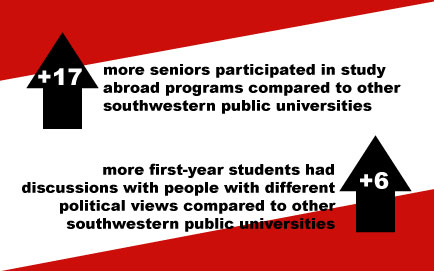
Texas Tech also participated in the NSSE Pulse during the fall semester to gain insight on student's perceptions of college-life during the COVID-19 pandemic. From the 2020 Pulse data, Texas Tech learned that two out of three students said their courses challenged them to do their best work, over 80% of students said their technology hardware and internet connection were sufficient in participating in online courses, and 74% of students said their experience at Texas Tech so far was either “excellent” or “good.”
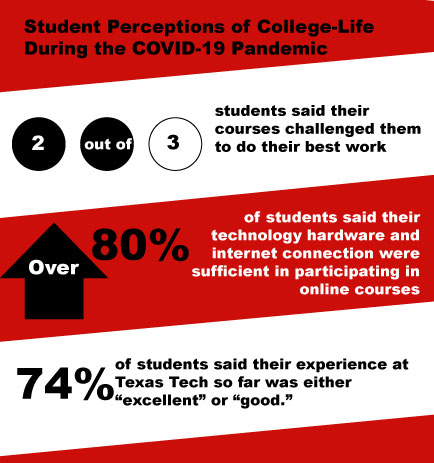
The NSSE website includes more examples of how universities use their data to improve the college experience for students, but the Office of Planning and Assessment has additional NSSE reports and data that departments and offices can use to better engage students in the future. We are happy to share that data and help put it to work, so please reach out to Bryson Carroll if you are interested in better understanding the information and how it can help you in reaching your goals.
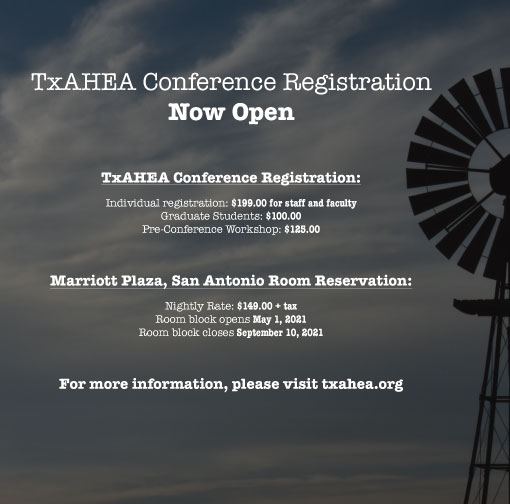
Digital Measures Updates
HB2504 Deadlines
Summer 1 Deadline: June 10th
Summer 2 Deadline: July 14th
Fall Deadline: August 31st
New Digital Measures Features and Projects
Each year Digital Measures imports tens if not hundreds of thousands of data points
from TTU systems. These data include faculty information, course data, grants and
publication information, and even departmental and college-level statistics. In 2020
TTU pushed Digital Measures to its limits, creating new reports, updating obsolete
reports, and redefining terms to account for changes in the Higher Education environment.
Below are some of the major changes to DM.
Raiders Engaged Survey
The Office of University Outreach and Engagement worked with OPA to develop a clone
of the Raiders Engaged Survey. Faculty should use this version of the survey, and
staff should continue using the Raiders Engaged Survey. This can be found on the Activities
screen of you Digital Measures account. Scroll down until you see the term ‘Engagement,'
and the link will open into the survey. Also note when entering other scholarly activity
that we have implemented an option to denote outreach and engagement activity.
Annual Faculty Reviews
Each year in January, thousands of Annual Faculty Reports are generated through the
use of Digital Measures at TTU. This year we paid special attention to the reports
in DM. With new colleges and departments created across campus, we have developed
new templates and new reports to fit the TTU community's needs. Digital Measures maintains
information that can be parsed out by nearly any data point stored in our systems,
so please let us help for accreditation reports, strategic planning, or any other
assessment needs!
Office of Planning and Assessment
-
Address
Administration Building, Suite 237, Box 45070 Lubbock, TX 79409-5070 -
Phone
806.742.1505 -
Email
opa.support@ttu.edu

